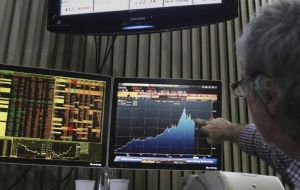MercoPress. South Atlantic News Agency
Excessive high-risk premium for Argentine assets, claims Macri official
 ”I don’t think the relative value between Argentina and other similar credits is at a balanced level,” said finance secretary Santiago Bausili
”I don’t think the relative value between Argentina and other similar credits is at a balanced level,” said finance secretary Santiago Bausili  Country risk, which is the extra yield that investors demand to hold a country’s debt over U.S. Treasuries, spiked at the end of 2018 to 8.3 percentage points
Country risk, which is the extra yield that investors demand to hold a country’s debt over U.S. Treasuries, spiked at the end of 2018 to 8.3 percentage points Investors have placed an excessively high-risk premium on Argentine assets compared to their peers, according to Finance Secretary Santiago Bausili, quoted in a report by Bloomberg. Argentina's country risk rating has been hovering at 7.0 percentage points.
”I don’t think the relative value between Argentina and other similar credits is at a balanced level,” Bausili said in an interview in Buenos Aires. “When we compare it to other countries in the region including Brazil, there’s an overshooting on the country risk in Argentina.”
Country risk, which is the extra yield that investors demand to hold a country’s debt over U.S. Treasuries, spiked at the end of 2018 to 8.3 percentage points before narrowing in the New Year to 7.04 percentage points.
Those swings have more to do with international events than with real fundamentals or change in policy at home, said Bausili, a former Deutsche Bank AG and JPMorgan Chase & Co executive.
The spread between Argentina and Brazil’s country risk has widened to more than 4.5 percentage points from just 1.4 percentage points a year ago. In that time frame President Mauricio Macri struggled to combat a currency crisis that led to a record International Monetary Fund credit line and Brazil elected a far-right conservative president vowing to impose liberal economic policies and privatizations.
Even Ecuador, with a much smaller economy, exposure to falling oil prices, no IMF credit line and a lower credit rating, is trading in line with Argentina in the bond market.
So what does Bausili see that perhaps some international fund managers are missing?
Argentina won’t tap international debt markets for the foreseeable future. Its dollar maturities over the next two years are mostly limited to a US$ 2.75 billion bond due in April this year and another in October of next year. The government is actively trying to convert a greater percentage of its total debt into local currency and has set conservative rollover targets for its local notes known as Letes, meaning it only needs to rollover 46% of the debt this year to meet its plan.
“There’s no need to tap international debt markets. If there’s an opportunity to refinance long-dated peso maturities would we do something? If the conditions are favorable, yes we would. That’s being constructive and prudent,” he said. “But as of today, there’s nothing in the pipeline.”
The Treasury will also have a surplus of dollars this year. When Argentina receives revenue from export tariffs and large dollar disbursements from the IMF, it will be exchanging them for pesos, and will be able to provide more hard currency to meet any rise in demand in case there is a flight to greenbacks amid the potential political volatility ahead of October’s election.
The central bank’s plan, agreed with the IMF, to stamp out volatility in the peso by imposing a trading band and draining liquidity from the market has worked so far. After sinking 50% last year, the currency has gained 1.4% this year. The monetary authority intervened on Thursday and Friday to buy dollars after the rally caused the peso to trade through the floor of the band.
“What can we do to lower sovereign risk? Continue executing an Orthodox response to the crisis,” Bausili said.




Top Comments
Disclaimer & comment rules-

Read all comments..says a guy who's certainly got most of his saving abroad. Argentina will most likely default in 2021.
Jan 12th, 2019 - 09:44 pm 0Commenting for this story is now closed.
If you have a Facebook account, become a fan and comment on our Facebook Page!